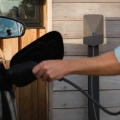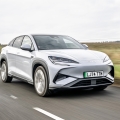The European Commission will promote the adoption of social leasing schemes for both new and used electric cars as part of its Action Plan to drive innovation, sustainability, and competitiveness in Europe’s automotive sector.
Publishing its plan today (5 March), the Commission said its upcoming ‘Recommendation on Transport Poverty’ would encourage EU member states to integrate social leasing schemes for zero emission vehicles into national plans, under the Social Climate Fund.
France has already piloted a heavy subsidised social leasing scheme, offering electric cars for €100 or €150 per month depending on the model to households with a taxable income below €15,400 per person. The scheme proved wildly popular, selling out its 50,000-car allocation in just six weeks.
The Commission has also published a ‘Communication on clean corporate fleets’ designed to accelerate the uptake of zero emission cars and commercial vehicles among larger businesses, which it says are responsible for over 60% of new vehicle registrations across the EU.
Its categories of corporate fleet include leasing and rental companies, as well as company cars, OEM in-house fleets, and taxis, logistics firms, buses and trucks.
Among the Commission’s immediate action areas are fiscal measures to make zero-emission vehicles more attractive to corporate fleets; local actions to support taxi and ride-hailing fleets to switch to electric vehicles; and unspecified initiatives to boost the uptake of zero emission vehicles among airport rental fleets. It promises to back these measures with a legislative proposal later this year.
Stef Cornelis, director of electric fleets at Transport & Environment, which has been lobbying the Commission to mandate a 100% zero-emission purchase target by 2030 for all companies that operate more than 100 cars and vans, said it was a big deal for the EU to propose a law this year to accelerate the electrification of company cars and the logistics sector.

“This is not only the right decision to cut emissions fast, but it will strengthen Europe’s competitiveness and support carmakers in their transition,” he said.
“The EU needs to propose a regulation setting binding EV targets for large companies. Any delay will deprive battery-makers and the charging industry of the investment guarantee that they need in the coming years.”
Leaseurope has called on the Commission to prioritise incentives that could support the development of a stable second-hand market for battery electric vehicles, which in turn would enable leasing companies to provide cost effective rentals for new vehicles.
The publication of the Action Plan follows the launch of the Commission’s Strategic Dialogue on the Future of the European Automotive Industry, which began in January.
The first fruit of this dialogue emerged this week with a dilution of the CO2 reduction targets that vehicle manufacturers have to meet this year. Instead of the average emissions of their new cars having to fall below 95g/km this year, OEMs will now be able to average their emissions over 2025-2027, giving them the flexibility to offset shortfalls this year with excess achievements in later years. The Commission has, however, retained its 2035 deadline for the phase out of the sale of new vehicles with internal combustion engines.

Sigrid de Vries, Director General of the European Automobile Manufacturers’ Association (ACEA), welcomed the breathing space provided by the extra flexibility for car and van makers to meet their CO2 targets.
But she reiterated ACEA’s demands for purchase and fiscal incentives to boost the mass adoption of zero-emission vehicles, alongside an increase in the Commission’s AFIR (Alternative Fuels Infrastructure Regulation) targets, which cover public charging infrastructure for electric vehicles, and specific financial support for zero emission heavy commercial vehicles.
The Commission has pledged to make another €570 million available under the AFIR Facility to roll out alternative fuels infrastructure this year and next, with a particular focus on the deployment of fast recharging points for heavy-duty vehicles.
Overall, the Commission’s Action Plan sets out five key priorities:
- Innovation and digitalisation.
- A shift to clean mobility.
- Ensuring competitiveness and supply chain resilience.
- Improving skills and addressing the social dimension.
- And guaranteeing a level playing field and a competitive business environment.
In the face of rapid technological change and a sharp increase in competition from China, the Commission wants to see a ramp up of the EU’s industrial capacity, both for batteries and for the software and technology that are paving the way for autonomous vehicles. Its ‘Battery Booster’ package, for example, aims to support the production of battery cells and components through direct funding and competitive loans.
It also wants European OEMS to build a common architecture for connected and autonomous vehicles, promising to refine the laws governing the testing of automated driving systems on public roads.
And it promised it stands ready to act against uncompetitive practices from state-backed OEMS.
But the Action Plan offers no new money, promising instead to “optimise the use of existing funding programs for vehicle purchases, recharging infrastructure deployment, and battery production.”
Moreover, while the EU can set the overall regulatory framework, it will be up to Member States to ensure this framework is implemented.

Ursula Von der Leyen, European Commission President, said the new Action Plan has been designed to help the European automotive industry take the lead globally.
“We will promote domestic production to avoid strategic dependencies, especially for batteries production. We will stick to our agreed emissions targets, but with a pragmatic and flexible approach. Our mutual aim is a sustainable, competitive, and innovative car industry in Europe that benefits our citizens, our economy, and our environment,” she said.









